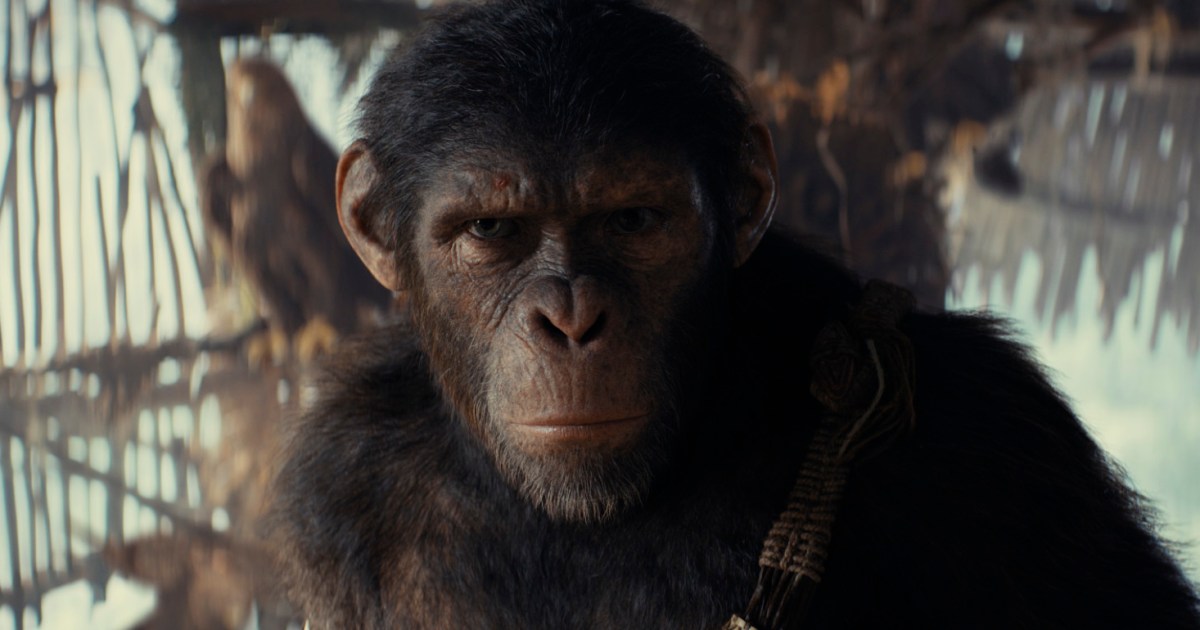Warning: This article contains spoilers for Kingdom of the Planet of the Apes (2024).
The 2017 film War for the Planet of the Apes famously ends with the death of Caesar (Andy Serkis). Its long-awaited follow-up, Kingdom of the Planet of the Apes, wisely opens with Caesar’s funeral before jumping forward in time “many generations later.”
For much of the film, Caesar’s absence is deeply felt. Viewers quickly learn that, in the years since his passing, the apes that have come after him have splintered off into different clans — some of which are more peaceful and isolated than others. His teachings have largely been either forgotten or perverted by power-hungry leaders like Proximus Caesar (Kevin Durand).
Life after Caesar
The film finds a worthy successor to Caesar, though, in Noa (Owen Teague), a young chimpanzee desperate to prove himself. When Proximus’ ape followers raid his peaceful village one night and kill his father right in front of him before capturing the other members of his clan, Noa sets out to find his surviving friends and family members and bring them back home. Along the way, he learns more about Caesar’s teachings and leadership from Raka (Peter Macon), a wise orangutan, and forges an unlikely alliance with Mae (Freya Allan), a deceptively smart human who knows how to get into a vault that Proximus is intent on breaking into.
Raka meets a tragic death when Noa and Mae are captured by Proximus’ apes. Noa, nonetheless, refuses to give up on his mission and ignores the warnings of his fellow clan members, whom he’s reunited with at Proximus’ coastline kingdom. He, Mae, and his two closest friends, Soona (Lydia Peckham) and Anaya (Travis Jeffery), secretly plant explosive charges along the dam-like wall that protects the entrance to Proximus’ man-made vault from the Pacific Ocean’s waves. The four then climb to a secret, cliffside entrance that leads directly into the vault itself. Once inside, Mae secures a hard drive containing information that could help humans talk to each other again.
A rebellion is born, and a new war is ignited
The foursome’s plan is briefly thwarted when they open the vault’s doors to find Proximus already waiting for them on the other side, with Noa’s mother held hostage. Mae, desperate to keep the vault’s human weaponry out of Proximus’ hands, ignores Noa’s pleas to wait until his mother and friends are out of the line of fire and detonates the charges they’d planted the night before. She escapes just before Noa and every other ape inside the vault is forced to flee further into it in order to avoid drowning beneath the oncoming waves. Noa manages to outsmart Sylva (Eka Darville), his father’s murderer and Proximus’ most loyal enforcer, but finds himself caught in a cliffside fistfight with Proximus immediately after he makes it out of the vault alive.
Rather than giving up and bowing down before Proximus, Noa calls on the help of his clan’s still-loyal eagle companions, who swarm and peck at Proximus. The ambitious ape leader plummets to his death only moments later — giving Noa the chance to finally lead his mother, friends, and fellow clan members back home. Kingdom of the Planet of the Apes doesn’t cut to black there, though. Instead, the film packs in a melancholic, yet optimistic epilogue in which Mae pays one last visit to Noa. The latter asks Mae whether or not she thinks humans and apes will ever be able to live peacefully together. She says that she doesn’t know. In response, Noa gives Mae Raka’s necklace as a reminder of not only Caesar’s belief in human and ape coexistence, but also the compassion that their friend showed both of them.
How does Kingdom of the Planet of the Apes end?
In its final minutes, Kingdom of the Planet of the Apes follows Mae and Noa as they part ways. The latter takes Soona to see a telescope he’d discovered earlier in the film. Mae, meanwhile, travels to a remote human outpost where she delivers the hard drive she retrieved from Proximus’ coastline vault, which contains long-lost satellite codes that give her and the other humans there the ability to communicate with other outposts for the first time. In a surprisingly powerful editorial flourish, Kingdom of the Planet of the Apes then ends with a series of cuts showing Mae and Noa looking up at the same sky from completely different locations — both unsure of what the future holds for them.
The film, therefore, concludes with Noa both rising to become a new, Caesar-like figure among his fellow apes and helping Mae potentially light the spark for a future war between them and the world’s surviving humans. It’s an ending that simultaneously paves the way for future sequels and occupies a similarly complex emotional space as the Planet of the Apes franchise’s previous three movies.
Like Caesar before him, Noa will continue to have to reckon with his conflicting desire for peace and his distrust of the humans he has no wish to harm. Whether or not he’ll have better luck doing so than Caesar remains to be seen. Either way, it should come as welcome news to Planet of the Apes fans everywhere that the series has managed to yet again deliver a new installment that is better and more interesting than it has any right to be.
Kingdom of the Planet of the Apes is now playing in theaters.
Editors’ Recommendations






